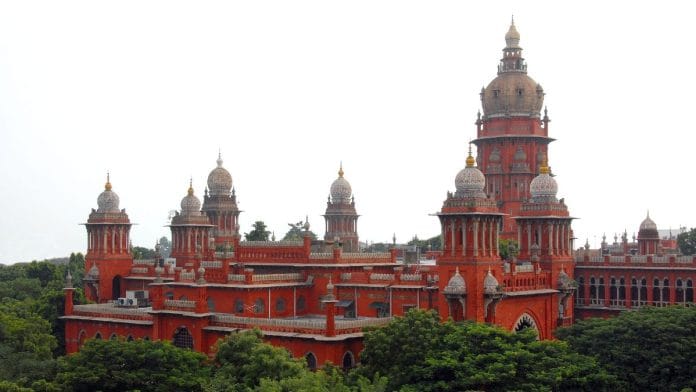New Delhi: A widow upon remarriage is not disqualified under the Hindu Succession Act, 1956 (HSA) from inheriting her first husband’s share in his family property, the Madras High Court has ruled.
Settling a property dispute between a man and his sister-in-law, a division bench of justices R. Subramanian and C. Kumarappan said the HSA would override the Hindu Widows’ Remarriage Act, 1856, which specifically kept a widow out of the line of successors in case she remarried.
Importantly, the bench also declared that succession of a property opens up only on the death of the absolute owner of the property and not when a settlement for devolving properties is executed.
Through its judgment, the court ruled in favour of a woman who had challenged the trial court decision denying her a share in her first husband’s property. The woman had remarried her husband’s brother after his untimely demise. The trial court’s decision arose from a partition suit that was filed by the woman’s second brother-in-law who sought division of properties into two equal shares between him and his second surviving brother.
What the case is about
The genesis of the case lies in a 1946 settlement deed that was executed by one Chinnu Gounder. In this deed, Chinnu Gounder named his three sons—Sevi Gounder, Chinnapaiya Gounder and Chinna Gounder—and his brother’s two sons as his legal heirs. The deed said that the five heirs could take life interest in the properties that would devolve to their male issues after their death.
In the absence of male heirs, the document noted, the properties would go to the other heirs.
The present case deals with the succession of properties acquired by Sevi Gounder, who had three sons—Ayyamperumal, S. Shanmugam and Chinnaiyan Gounder. Though Sevi died in 2004, one of his sons, Chinnaiyan, passed away in 1968. The dead son’s widow Mallinga, remarried the second son, Ayyamperumal.
A partition suit was filed in 2013 by Sevi’s third son, Shanmugam, seeking the division of the three properties. While two were ancestral, the third was a joint purchase by Shanmugam and Ayyamperumal. Shanmugam was claiming 50 percent stake in all three.
Ayyamperumal challenged the suit on the ground that Mallinga was entitled to one-third share in two family properties. He had also claimed that since by an oral partition, Sevi had allotted specific portions of the property to the parties, the demand for partition was not legally right.
In 2017, the trial court rejected Ayyamperumal and Mallinga’s plea. It declined to accept the existence of an oral partition and held that Mallinga was not entitled to a share in Chinnaiyan’s property since she had remarried.
Mallinga questioned the judgment before the Madras HC, where she termed the trial court’s finding erroneous. She argued that after the HSA’s enactment, a widow who remarries cannot be disqualified from succeeding to the estate of her first husband.
However, Shanmugam countered her argument, contending that the HSA’s invocation was not correct because the original settlement deed’s writer—his grandfather—died prior to the commencement of the law.
Shanmugam argued that the succession opened on the date when his grandfather died and, therefore, the Hindu Widows’ Remarriage Act, 1856, which disqualifies a widow from inheriting her husband’s share upon remarriage, would operate in this case.
He also quoted section 24 of the HSA to argue against Mallinga’s right as a successor, which said that widow who remarried after her spouse’s death would forfeit her right to inherit from his estate. This section was, however, repealed in 2005.
The HC rejected Shanmugam’s opposition and allowed Mallinga’s appeal. It said that since the settlement deed was executed in 1946, the male issues became vested remaindermen (people with the absolute right to receive a property after a preceding interest in that property has ended) the moment they were born.
In such a case, if the male issues die prior to the life estate holder (one who is the owner of the property), the vested remainder or the right to acquire devolves to their heirs.
The court rejected the argument that “the Hindu Widows’ Remarriage Act, 1856 would apply because the settlement deed executor died before the commencement of the HSA” as fallacious.
It said vested remaindermen get their right upon the execution of a document in their favour. And, if the document which confers a right on them is executed prior to their birth, they acquire the right upon birth.
Therefore, Chinnaiyan had already inherited his share of his father’s property. Since he died after the commencement of the HSA, the said law would apply in the case at hand because succession in his case opened upon his death in 1968 and not when the settlement deed was executed by the grandfather in 1946, the HC explained.
It also said that the Hindu Widows’ Remarriage Act ceased to apply upon enactment of the HSA.
The HC quoted a Supreme Court judgment in support of this finding. Section 4 of the HSA, it explained, gives an overriding effect to the provisions of the law as against any other text of Hindu law or enactment insofar as it is inconsistent with its sections.
As far as the HSA is concerned, the court noted, the law does not contain any provision that disqualifies widows from inheriting their husband’s properties or disqualifying the widows from taking a share in the husband’s property upon remarriage.
(Edited by Radifah Kabir)
Also Read: ‘Brahmin citadel’, rebranded Bharatanatyam — what’s Madras Music Academy, in eye of TM Krishna storm







So legally speaking, if a woman marries five times, she will be eligible for her ex-husband’s share of family inheritance – for each of her four ex-husbands.
Wow! That’s something indeed!